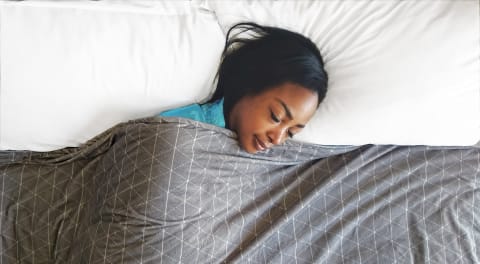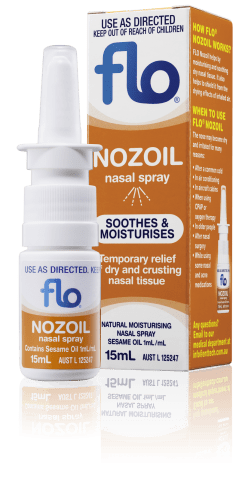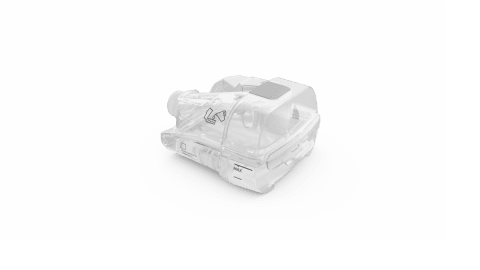CPAP
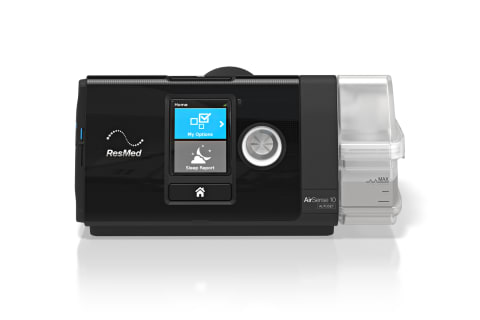 Further $50 Off with code "SUMMER50"
Further $50 Off with code "SUMMER50"
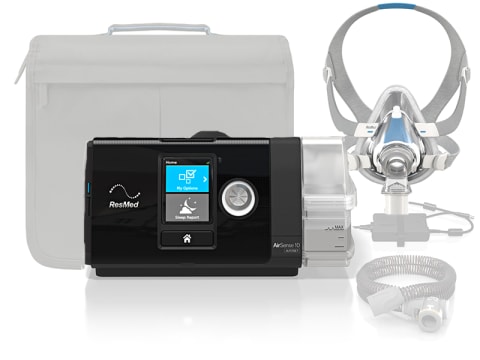 Further $50 Off with code "SUMMER50"
Further $50 Off with code "SUMMER50"
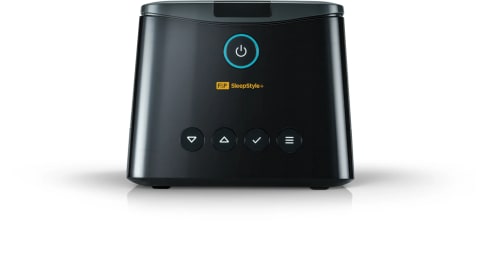
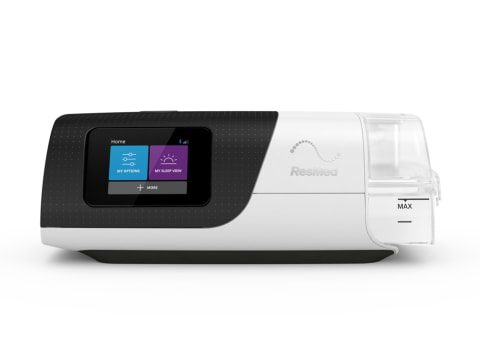 Further $100 Off with code "BOXINGDAY100"
Further $100 Off with code "BOXINGDAY100"
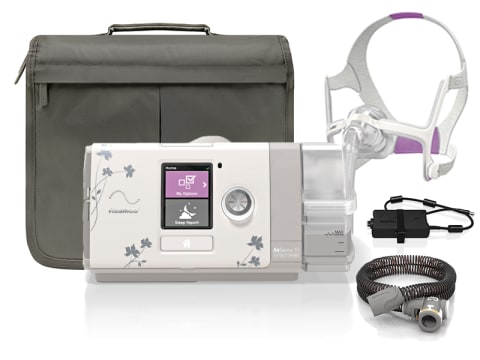 Further $50 Off with code "SUMMER50"
Further $50 Off with code "SUMMER50"
CPAP stands for Continuous Positive Airway Pressure. It’s a highly effective treatment for obstructive sleep apnea. The device sits by your bedside and delivers a gentle, continuous flow of pressurised air through a mask and tubing system to help keep your airways open while you sleep. Unlike an oxygen machine, a CPAP device does not supply oxygen. Instead, it helps maintain open airways throughout the night, allowing you to breathe normally and sleep more comfortably. By supporting normal breathing during sleep, CPAP therapy can help reduce or eliminate symptoms of obstructive sleep apnea such as snoring, daytime tiredness, and morning headaches.
CPAP therapy is designed to primarily treat obstructive sleep apnea (OSA) — a condition where the muscles in the throat relax during sleep, causing the airway to narrow or close. These pauses in breathing can happen repeatedly throughout the night, leading to poor sleep quality, loud snoring, and excessive daytime fatigue.
OSA is often linked to factors such as excess weight, genetics, and certain anatomical features that make the airway more prone to collapsing during sleep. These can include a narrow airway, enlarged tonsils or adenoids, or a large neck circumference.
Each time breathing stops, the brain briefly arouses the body from sleep to restore airflow. These repeated awakenings often go unnoticed but prevent deep, restorative sleep and disrupt the natural sleep cycle, leaving the person feeling unrefreshed and tired during the day.
If left untreated, OSA can increase the risk of high blood pressure, heart disease, stroke, and type 2 diabetes. This is because the low oxygen levels that occur during sleep place extra strain on the heart and body, forcing them to work harder to maintain normal function.
While CPAP therapy is highly effective for managing obstructive sleep apnea, other sleep-related breathing disorders — such as central sleep apnea (CSA) or certain respiratory conditions — may require other specialised treatments. To see if CPAP therapy is appropriate for you, speak to your doctor.
There are three main types of positive airway pressure (PAP) machines: CPAP (Continuous Positive Airway Pressure), APAP (Automatic Positive Airway Pressure), and BiPAP (Bi-level Positive Airway Pressure). Each device delivers pressurised air differently to keep your airway open during sleep. CPAP delivers a fixed pressure, APAP automatically adjusts pressure throughout the night, and BiPAP alternates between two pressure levels — one for inhaling and one for exhaling.
• CPAP (Continuous Positive Airway Pressure) : Delivers a single, constant pressure throughout the night to keep your airways open. CPAP therapy is most suitable for people with obstructive sleep apnea (OSA) who have consistent pressure needs determined during a sleep study. It’s often prescribed for those who tolerate steady pressure well and do not experience significant pressure fluctuations during sleep.
• APAP (Automatic Positive Airway Pressure) : Adjusts pressure automatically in real time, based on your breathing patterns and airway resistance. APAP is ideal for individuals with obstructive sleep apnea whose pressure needs vary during the night — for example, depending on sleep position, stage of sleep, or nasal congestion. It is commonly prescribed for people who are newly diagnosed with sleep apnea, or for those who find a fixed pressure uncomfortable. APAP is a popular therapy because it responds in real time to airway obstructions. The device automatically delivers only the minimum pressure required to keep airflow stable, helping maintain open airways while providing a more natural and comfortable breathing experience throughout the night.
• BiPAP (Bi-Level Positive Airway Pressure): BiPAP delivers two distinct levels of pressure — a higher pressure during inhalation to keep the airway open and a lower pressure during exhalation to make breathing out easier. This dual-pressure system feels more natural and comfortable, particularly for individuals who struggle with continuous pressure from a standard CPAP. BiPAP is often recommended for people who require higher pressure settings, have certain respiratory or medical conditions such as chronic obstructive pulmonary disease (COPD), obesity hypoventilation syndrome, or central sleep apnea, or who experience difficulty tolerating CPAP or APAP therapy due to discomfort or complex breathing patterns during sleep. By adjusting pressures for inhalation and exhalation, BiPAP provides more effective therapy while reducing strain on the lungs and helping users maintain a steady, comfortable breathing rhythm throughout the night.
It’s common for new and even experienced CPAP users to experience some discomfort, but there are many ways to make therapy more comfortable and effective. Start by checking your mask fit, as a mask that is too tight or poorly positioned can cause pressure points, skin irritation, or leaks. Adjusting the humidifier settings can also help, since dry air can lead to nasal irritation, dryness, or congestion.
If discomfort persists, consider trying a different mask style — for example, nasal pillows, full-face masks, or nasal masks — as different designs suit different facial structures and sleeping positions. Heated tubing or heated humidification can further improve comfort by reducing dryness and irritation.
Sometimes, the pressure settings may be contributing to discomfort. While your prescribed pressure is important for effective therapy, small adjustments may help make breathing easier and reduce strain during sleep. Only a qualified clinician should make these changes, so it’s important to seek guidance rather than adjusting settings on your own.
If these measures don’t fully resolve the issue, contact Sove CPAP Clinic for a consultation. Our experienced CPAP consultants can assess your current setup, identify the source of discomfort, make personalised adjustments to your mask, humidification, or pressure settings, and provide guidance on strategies to improve comfort. With the right support and adjustments, CPAP therapy can become much more comfortable, helping you achieve restful, uninterrupted sleep and improve your overall health and wellbeing.
CPAP and APAP machines are designed to provide consistent therapy, but over time, settings or components may need adjustment to ensure comfort and effectiveness. There are several signs that your device might require calibration or review. You may notice persistent discomfort, such as difficulty exhaling, mask leaks, or pressure points on your face. Other indicators include continued daytime fatigue, morning headaches, loud snoring, or disrupted sleep, which could suggest that the pressure settings are no longer optimal or that the device isn’t functioning as intended.
Changes in your weight, health conditions, or lifestyle can also affect your therapy requirements. For APAP machines, which automatically adjust pressure, it’s important to have a clinician review the device data periodically to confirm that the automatic adjustments are appropriate for your current needs. Even CPAP machines, which deliver a fixed pressure, may need evaluation if your symptoms persist or if the machine has been in use for an extended period.
Regular professional checks help ensure that all components — including the mask, tubing, humidifier, and machine itself — are working correctly. It’s important not to adjust pressure settings on your own, as improper changes can reduce therapy effectiveness or cause discomfort.
If you experience any of these issues, contact Sove CPAP Clinic for a consultation. Our team can assess your CPAP or APAP machine, review your therapy data, check for proper calibration, and make personalised adjustments. Regular maintenance and professional adjustment help maintain optimal sleep quality, reduce symptoms of sleep apnea, and support your long-term health.
Absolutely. Our team of sleep and respiratory physicians and CPAP consultants are here to help with all aspects of CPAP therapy, including pressure settings, mask leaks, dryness, noise concerns, and general comfort. We provide both free over-the-phone support and in-person troubleshooting at our clinics to ensure your therapy is as effective and comfortable as possible.
During a consultation, we can assess and adjust your pressure settings, check the fit of your mask, and make changes to humidification or other comfort settings to improve your experience. We can also download and review therapy data, allowing us to evaluate the effectiveness of your treatment and make evidence-based recommendations.
In addition, our team can inspect your equipment for any malfunctions or errors, advise on proper maintenance and cleaning, and provide guidance to help extend the life of your device. Whether you are a new user adjusting to therapy or an experienced user experiencing changes in your needs, our team can provide personalised support to ensure your CPAP therapy continues to deliver restful, uninterrupted sleep and the maximum health benefits.
At Sove CPAP Clinic, we aim to make CPAP therapy simple, comfortable, and effective, providing comprehensive guidance and support at every step of your journey.
Regular replacement of CPAP components is essential to maintain comfort, hygiene, and the effectiveness of your therapy. Each part of the machine has a recommended lifespan, and replacing them on schedule can help prevent issues such as leaks, bacterial buildup, or decreased therapy efficiency.
The mask cushion, which comes into direct contact with your face, should generally be replaced every 3 to 6 months, as it can wear down, lose its seal, or become less comfortable over time. The mask frame and headgear, which support the cushion, typically last 6 to 12 months depending on use and care. These parts can stretch or degrade, affecting fit and comfort.
Filters should be checked and replaced monthly or as needed, especially if they appear dirty or discoloured, as clogged filters can reduce airflow and affect machine performance. The tubing that connects your mask to the machine should be replaced every 6 to 12 months to prevent wear, cracks, or bacterial growth.
The water chamber in your humidifier, which is exposed to moisture and heat, should be replaced annually to maintain hygiene and prevent buildup of mineral deposits or bacteria.
Following these replacement schedules ensures your CPAP therapy remains safe, effective, and comfortable, while also helping your equipment last longer. Always refer to the manufacturer’s guidelines for your specific device, and if you notice any signs of wear, damage, or discomfort, contact your CPAP provider for advice and replacement.
Modern CPAP devices, such as the ResMed AirSense 11 or Yuwell BreathCare III, are designed to be extremely quiet, typically operating at around 26–30 decibels, which is the sound of a soft whisper. Thanks to advances in motor technology and airflow design, these machines provide effective therapy without disrupting your sleep or that of your bed partner.
Many users find that after a short adjustment period, the sound of the machine becomes almost unnoticeable, allowing for restful, uninterrupted sleep. Additionally, the soft hum of a CPAP can sometimes even be soothing, similar to white noise, helping some people fall asleep more easily.
If noise is a concern, there are a few tips to further minimise sound. Placing the machine on a stable surface, using insulated tubing, or adjusting the humidifier settings can help reduce any subtle noise. Our team at Sove CPAP Clinic can also guide you in optimising your setup for maximum quietness and comfort.
Modern CPAP technology ensures that effective sleep apnea therapy doesn’t have to come with disruptive noise, making it easier than ever to enjoy a full night of restorative sleep.
CPAP therapy is a highly effective way to manage sleep apnea, but it is important to understand that it is a management tool, not a cure. Your sleep apnea is only controlled while the CPAP is in use — once you stop using it, airway collapses can return, and symptoms such as snoring, interrupted sleep, and daytime fatigue may quickly reappear.
While occasional missed nights won’t completely undo your progress, consistency is key for achieving the full benefits of therapy. Most sleep specialists recommend using CPAP for at least 70% of nights each week to maintain effective management of your condition. Regular use of your CPAP helps manage sleep apnea while the device is in use, keeping your airways open and oxygen levels steady throughout the night. Left unaddressed, sleep apnea can place significant strain on the heart and body over time, increasing the risk of high blood pressure, cardiovascular disease, stroke, and cognitive impairment.
To maintain this level of consistency, try to incorporate CPAP into your nightly routine, and use it even during naps if possible. If discomfort, mask leaks, dryness, or pressure issues make it difficult to use nightly, speak with your CPAP consultant or sleep physician. Often, small adjustments to the mask fit, humidification, or pressure settings can significantly improve comfort and adherence.
At Sove CPAP Clinic, our sleep and respiratory specialists are here to help you understand the importance of regular use, troubleshoot issues, and provide strategies to support consistent therapy. By committing to regular CPAP use, you can effectively manage your sleep apnea, improve sleep quality, reduce daytime fatigue, and support long-term heart and brain health.
There are several ways to tell whether your CPAP therapy is effective. One of the most noticeable signs is improved sleep quality. You should wake up feeling more refreshed and alert, with less daytime fatigue and reduced morning headaches. You may also notice that your snoring has decreased and that you feel more energized and focused throughout the day.
Modern CPAP and APAP devices, like the ResMed AirSense 10 or 11, track important metrics such as hours of usage, mask seal quality, and your Apnea-Hypopnea Index (AHI), which measures the frequency of breathing interruptions during sleep. An AHI value of 5 or less is generally considered an indication that your CPAP therapy is effectively managing obstructive sleep apnea. These metrics provide an objective way to assess whether your CPAP is consistently keeping your airways open and maintaining steady oxygen levels during the night.
At Sove CPAP Clinic, our team of sleep and respiratory specialists can review your therapy data and help interpret your results. We can identify patterns, such as nights with poor mask seal or reduced usage, and provide guidance on adjustments to improve comfort and effectiveness. This might include fine-tuning pressure settings, optimizing mask fit, adjusting humidification, or recommending different equipment if needed.
Even if you feel better, regular monitoring of your CPAP data is important, as some breathing events can occur without obvious symptoms. By combining subjective improvements in sleep and energy with objective therapy metrics like AHI, you and your clinician can be confident that your treatment is effectively managing your obstructive sleep apnea and supporting better overall health.
Choosing the right CPAP device depends on your individual needs, sleep study results, and medical history. Each type of machine delivers therapy differently, and the most suitable option is determined by your sleep and respiratory specialist.
A fixed-pressure CPAP delivers one consistent airflow pressure set by your doctor. This type is commonly prescribed for people whose sleep apnea severity is stable throughout the night and provides a simple, reliable therapy option.
An auto-adjusting CPAP (APAP) automatically adjusts pressure throughout the night based on your sleep position and sleep stage. APAP devices are ideal for people whose airway obstruction varies, providing only the minimum pressure needed at any given time, which can make therapy feel more natural and comfortable.
A bilevel device (BiPAP) is designed for people who have difficulty tolerating continuous airflow. It delivers two distinct pressures — a higher pressure during inhalation and a lower pressure during exhalation — helping to improve breathing comfort and adherence for users with higher pressure needs or certain medical conditions such as central sleep apnea or chronic obstructive pulmonary disease.
At Sove CPAP Clinic, our Sleep and Respiratory physicians can review your sleep study data, medical history, and comfort preferences to determine which device — CPAP, APAP, or BiPAP — is most suitable. We then customise the setup, including mask selection and pressure settings, to ensure therapy is comfortable, effective, and sustainable, helping you achieve restorative sleep and improved overall health. To find out which CPAP type is right for you, it’s important to speak with your doctor who can recommend the best device based on your individual needs.
At Sove CPAP Clinic, we offer multiple convenient options for purchasing a CPAP machine to suit your needs. You can buy online through our website sove.com.au, where we stock leading brands such as ResMed, Yuwell, Philips and Fisher & Paykel.
If you prefer personalised guidance, you can speak directly with one of our CPAP consultants over the phone. Call 1300 76 29 39 for remote assistance, and our team can help you choose the right device, place your order, and answer any questions about setup, usage, or ongoing care.
For those who would like in-person support, you can book an appointment at one of our clinics by calling 1300 76 29 39. During your visit, our specialists can demonstrate how to use, set up, and maintain your CPAP machine, as well as perform a mask fitting to ensure comfort and effective therapy. Our goal is to make sure your device is optimally configured for your individual needs, helping you get the most benefit from your treatment.
Whether you choose online, over-the-phone, or in-clinic purchasing, Sove CPAP Clinic is committed to providing expert guidance, high-quality equipment, and personalised support to make starting or upgrading your CPAP therapy simple, comfortable, and effective.
A prescription is not required to purchase an APAP (auto-adjusting CPAP) machine, although it is highly recommended to have a recent sleep study. This ensures that your device is set up with the appropriate pressure range and comfort settings for your individual needs, maximizing the effectiveness of your therapy.
For fixed-pressure CPAP machines, a prescription is required for new users. This ensures that your device is set to the pressure recommended by your sleep physician based on your sleep study results. For users who have been on fixed-pressure therapy for some time, we require the current prescribed pressure setting to ensure continuity of treatment and maintain effective therapy.
For BiPAP and other specialized devices, a prescription is required. These devices are typically used for individuals with more complex sleep apnea, higher pressure needs, or underlying medical conditions such as central sleep apnea, COPD, or neuromuscular disorders, and a prescription ensures the therapy is safely tailored to the patient’s requirements.
At Sove CPAP Clinic, our team can guide you through the process, whether you are a new user seeking your first device or an experienced patient upgrading or replacing your equipment. We can provide advice on device selection, mask fitting, and setup to ensure your therapy is comfortable, effective, and safe.
Choosing the right CPAP mask is a crucial part of effective therapy, as the mask affects comfort, fit, and the overall success of your treatment. When selecting a mask, several factors should be considered, including your sleeping position, breathing style, facial structure, and personal comfort preferences.
Full-face masks deliver air to both the nose and mouth and are ideal for people who breathe through their mouth during sleep or require higher pressure settings. They provide a secure seal and help prevent leaks that can occur when the mouth opens at night.
Nasal masks cover the nose only or sit just beneath the nose, and are generally well-suited for side or back sleepers who primarily breathe through their nose. They provide a balance of comfort and stability while delivering effective therapy.
Nasal pillows are small, minimal-contact masks that sit directly at the nostrils. They are lightweight and allow for greater freedom of movement, making them a popular choice for people who feel claustrophobic with larger masks or prefer a less obtrusive design.
Other factors to consider include mask material, strap design, cushion softness, and compatibility with glasses or other sleep accessories. The right mask should form a secure seal without causing pressure marks, allowing you to sleep comfortably throughout the night.
At Sove CPAP Clinic, we offer personalised mask fittings to help you find a mask that suits your facial structure, therapy requirements, and lifestyle. During your appointment, our CPAP specialists will assess your needs, demonstrate different mask options, and ensure a proper fit so that your therapy is both effective and comfortable.
A well-chosen CPAP mask not only improves comfort but also increases adherence, helping you consistently manage your sleep apnea and achieve restorative sleep.
Yes - CPAP masks come in a wide variety of types, styles, materials, and sizes to suit different face shapes, sleeping positions, and breathing habits. Finding the right mask is essential for ensuring your therapy is both comfortable and effective, as a proper fit helps prevent air leaks and makes nightly use much easier.
There are three main types of CPAP masks: full-face masks, nasal masks, and nasal pillow masks.
Full-face masks can either cover both the nose and mouth or cover the mouth and sit just beneath the nose. They are best suited for people who breathe through their mouth during sleep or require higher pressure settings.
Nasal masks can either cover the nose entirely or sit comfortably beneath the nose, making them a great option for nasal breathers or side sleepers who prefer a lighter fit.
Nasal pillow masks rest gently at the nostrils and are the most minimal and lightweight option, ideal for those who like more freedom of movement or feel claustrophobic with larger masks.
Masks are also available in different materials such as silicone, memory foam, and fabric, each offering a distinct feel. Silicone cushions are soft and durable, memory foam provides a more adaptive seal, and fabric offers a gentle, breathable touch. Choosing the material that feels most comfortable for your skin and sleep style is key to long-term success.
All CPAP masks come in various sizes, allowing you to find the fit that best suits your facial features. It’s important to note that each brand and mask model may use a slightly different sizing system, so you may not wear the same size across different mask types.
Some masks also have interchangeable parts with multiple sizing options. For example, certain masks come with small or large headgear options in addition to the standard size, and masks with top-of-head tubing often include different frame sizes. ResMed also offers a “For Her” range, featuring popular mask styles designed with smaller headgear and frame options to suit female facial dimensions.
Many mask components — including headgear, frames, and cushions — can be mixed and matched within the same mask model to create a more customised fit.
Because sizing and compatibility can vary between brands, a professional mask fitting is highly recommended. At Sove CPAP Clinic, our consultants can assess your facial structure, breathing style, and comfort preferences to help you select the right combination of mask type, size, and material for your needs.
A properly fitted mask makes all the difference — improving comfort, reducing leaks, and ensuring you get the most out of your CPAP therapy every night.
Adjusting to CPAP therapy is a gradual process that varies from person to person, but most users begin to feel comfortable and notice improvements in their sleep within two to four weeks of consistent use. The key to successful adaptation is patience, persistence, and proper support.
In the first few nights, it’s normal to experience some challenges — such as getting used to the sensation of airflow, the mask on your face, or the sound of the machine. Starting slowly can help: try wearing your mask for short periods while reading or watching TV before bed to help your body and mind adjust to the feeling.
Using your CPAP every night — even during naps — is one of the most important factors in adapting successfully. Consistency helps your body get used to sleeping with the device and allows you to experience the full benefits of therapy, such as reduced snoring, fewer awakenings, and improved daytime alertness.
Finding the right mask style and fit is another critical step. Discomfort or air leaks can make it harder to stay consistent, so experimenting with different mask types — such as full-face, nasal, or nasal pillow masks — can make a big difference. Adjusting the humidifier settings or using heated tubing can also help reduce dryness or congestion and improve comfort.
If you’re struggling with pressure discomfort, features like the ramp function (which gradually increases pressure as you fall asleep) and expiratory pressure relief (EPR) (which slightly lowers pressure during exhalation) can make breathing feel more natural.
Remember, it’s perfectly normal to need a little time and adjustment. With regular use and proper guidance, CPAP therapy becomes a seamless part of your nightly routine.
At Sove CPAP Clinic, our consultants are here to help you every step of the way — from initial setup and mask fitting to troubleshooting and comfort adjustments — so you can adapt smoothly and achieve the restful sleep you deserve.
We offer: • Sleep study coordination • CPAP machine setup and mask fitting • Data downloads and compliance reports
At Sove CPAP Clinic, we’re committed to supporting you through every stage of your sleep and CPAP therapy journey — from diagnosis to long-term care. Our team of experienced Sleep and Respiratory Physicians and CPAP Consultants provide personalised, ongoing assistance to help you achieve the best results from your treatment.
We can assist with sleep study coordination, helping you organise a bulk billed home-based sleep study (Medicare criteria and T&Cs apply). Your results are reviewed by a qualified Sleep Physician who will recommend the most suitable therapy and settings for your needs.
Once you begin treatment, we provide CPAP machine setup and mask fitting to ensure your equipment is working correctly and comfortably. During your appointment, our consultants will guide you through how to operate, clean, and maintain your device, while helping you find the right mask for your comfort and therapy requirements.
To help you track your progress, we also offer data downloads and compliance reports that outline your usage, leak rates, and AHI (Apnea–Hypopnea Index). These reports can be reviewed by our clinicians or your doctor to make sure your therapy remains effective over time.
Ongoing support is always available through phone, telehealth, or in-person consultations. Whether you need help troubleshooting your device, adjusting settings, or replacing parts, our team is here to help you stay comfortable and confident with your therapy.
Our goal is to ensure you feel fully supported at every step of your CPAP journey — so you can sleep better, breathe easier, and experience lasting improvements in your health and wellbeing.
No - pressure settings should only be adjusted by a qualified clinician. These settings are carefully prescribed based on your sleep study results and medical needs to ensure your therapy is both safe and effective. Changing the pressure yourself without proper guidance can reduce the effectiveness of your treatment or cause discomfort, such as air leaks, dryness, or difficulty exhaling.
If you feel your current pressure may not be right — for example, if you’re still experiencing snoring, fatigue, or shortness of breath — our team can help. Your pressure settings can be adjusted in person during a clinic appointment, or remotely for devices with a built-in cellular modem, such as the ResMed AirSense 10 and AirSense 11.
If you’re unable to attend an appointment and your device does not support remote adjustment, we recommend calling 1300 76 29 39 to speak with one of our CPAP consultants. They can review your situation, guide you through the safe process of updating your settings if appropriate, and ensure you are using the optimal pressure for effective therapy.
Maintaining the correct pressure is essential for consistent, comfortable, and effective CPAP treatment — so always consult a professional before making any changes.
Your CPAP machine should be used every night, ideally for the full duration of your sleep, including naps. Consistent nightly use is the key to managing obstructive sleep apnea effectively and achieving its long-term health benefits. For therapy to be effective, it’s generally recommended to use your CPAP for at least four hours each night, although longer usage provides the best results.
CPAP therapy manages your sleep apnea symptoms but does not cure the condition. This means that if you skip nights, symptoms such as snoring, poor sleep quality, and daytime fatigue can return immediately. Over time, untreated sleep apnea can increase the risk of high blood pressure, heart disease, stroke, and reduced cognitive function.
It’s also recommended to use your CPAP for at least 70% of the week (around five nights or more) to maintain consistent therapy and accurate data for monitoring. By making CPAP part of your nightly routine and ensuring a minimum of four hours per night, you’ll experience better sleep, improved energy, and long-term health benefits.
Most people tolerate CPAP therapy well, but some may experience mild side effects, especially in the early stages of treatment. Common issues include dryness of the nose or mouth, nasal congestion, skin irritation, or bloating (also known as aerophagia). These effects usually occur as your body adjusts to the airflow and mask.
Many of these side effects can be easily managed. Using a humidifier or adjusting its settings can help reduce dryness and congestion, while changing mask styles or cushions can alleviate pressure points or irritation. Features such as heated tubing or expiratory pressure relief (EPR) may also improve comfort by making airflow feel more natural.
In some cases, mask leaks or incorrect pressure settings can contribute to discomfort or noise. A professional assessment can help resolve these issues and ensure your therapy is both effective and comfortable.
It’s important not to ignore persistent discomfort. If mild side effects do not improve with adjustments, speak to your doctor. Our team of CPAP consultants and Sleep and Respiratory Physicians can review your setup, make pressure or mask modifications, and provide guidance on cleaning, maintenance, and optimal usage to improve your experience.
With proper support and adjustments, most users quickly adapt to CPAP therapy and enjoy restful, uninterrupted sleep, reduced daytime fatigue, and the long-term health benefits of effectively managing sleep apnea.
Yes — there are lightweight, travel-sized CPAP machines designed specifically for convenience on the go. Devices like the ResMed AirMini™ are compact enough to fit in the palm of your hand or a small travel bag, making them ideal for business trips, holidays, or overnight stays away from home. Despite their smaller size, these portable machines provide the same effective therapy as traditional CPAP devices, ensuring your sleep apnea is managed consistently wherever you are.
Travel-friendly CPAP machines are compatible with most standard mask types, including nasal, full-face, and nasal pillow masks. Some devices can even operate on 12V power sources, making them suitable for use in cars, RVs, or planes where allowed.
These portable machines are especially beneficial for people who want to maintain therapy consistency without sacrificing convenience. With a travel-friendly CPAP, you can continue your treatment uninterrupted, enjoy restful sleep, and reduce the risks associated with untreated sleep apnea, even while away from home.
At Sove CPAP Clinic, we can help you choose a portable device, set it up, and ensure it’s fully compatible with your preferred mask and therapy settings so you can travel with confidence.
No, CPAP machines are not covered by Medicare in Australia. However, at-home sleep studies may be bulk-billed for eligible patients under Medicare (Medicare criteria and T&Cs apply). Additionally, consultations with Sleep and Respiratory Specialists are also eligible for Medicare rebates, helping to lower the cost of professional assessment and ongoing care.
Many private health insurance extras policies offer partial rebates for CPAP machines, masks, tubing, and other accessories, though coverage can vary depending on your insurer and the specific level of your policy. Some policies may cover a percentage of the device cost, while others may provide rebates for replacement parts an accessories.
It’s important to check your individual policy to understand exactly what is included, any limits or caps, and whether you need a prescription or specialist report to claim. Your private health fund may also require certain documentation, such as proof of a sleep study or confirmation of your CPAP prescription, before processing a rebate.
Choosing the right CPAP provider is just as important as selecting the right device, as it can significantly affect the success and comfort of your therapy. A quality provider should offer clinical expertise, with access to Sleep and Respiratory Physicians and trained CPAP consultants who can provide personalised guidance based on your medical history, sleep study results, and individual therapy needs.
Comprehensive aftercare support is another key factor. The provider should be available to help you with mask fittings, pressure adjustments, troubleshooting, replacement parts, and maintenance of your equipment. This ongoing support ensures you remain comfortable and consistent with your therapy over time.
Look for providers who can give independent advice and carry a range of leading CPAP brands, so you can find the device and mask combination that suits you best. At Sove CPAP Clinic, we carry leading brands including Resmed, Philips, Fisher & Paykel and Yuwell. It’s also important that the provider supports genuine manufacturer warranties, ensuring that any repairs or replacements are handled properly and that your equipment remains reliable.
Accessibility is another consideration. Choose a provider with flexible service options, including in-person clinics, online ordering, and telehealth consultations, so you can receive help wherever and whenever you need it.
Ultimately, the best CPAP provider is one that combines expert clinical guidance, a wide selection of devices, ongoing support, and reliable warranty service — giving you confidence in both your therapy and your equipment.
Keeping your CPAP equipment clean is essential for ensuring effective, comfortable, and hygienic therapy. Regular maintenance helps prevent respiratory infections, sinus irritation, and skin issues, while also prolonging the lifespan of your device and accessories. Establishing a consistent cleaning routine will help you get the most out of your therapy and maintain optimal performance.
Daily care should begin with the water chamber. After each night, empty any remaining water, as standing water can quickly become contaminated with bacteria or mold. Rinse the chamber thoroughly with warm, clean water and allow it to air dry away from direct sunlight. Once a week, give the chamber a deeper clean by soaking it in a mild solution of one part white vinegar to three parts water for 15–20 minutes. This removes mineral deposits that can build up over time, especially if tap water is used. Always rinse thoroughly and allow the chamber to dry completely before refilling. Using distilled water each night helps prevent residue build-up and keeps your humidifier cleaner for longer.
Your mask and tubing also require weekly cleaning. Wash these parts in warm, soapy water using a mild, non-moisturising soap, then rinse thoroughly and allow them to air dry completely. Hang tubing over a towel rack or shower rod and place the mask on a clean towel. Avoid direct sunlight, heaters, or hair dryers, as excessive heat can damage silicone and plastic components. For foam cushions, never submerge in water; instead, wipe gently with a damp cloth or CPAP-approved wipes. Silicone cushions can benefit from a quick daily rinse to remove oils and sweat, maintaining a secure seal and improving comfort.
The headgear should be washed every one to two weeks using warm water and mild soap. This removes sweat, oils, and residue that can affect elasticity and comfort. Squeeze out excess water and allow it to air dry flat or hung in a clean space.
Your CPAP device should be wiped regularly with a soft, slightly damp cloth to remove dust, taking care to avoid moisture entering the electrical components or air outlet. Check the air filter and replace it according to manufacturer guidance, usually every one to three months, to ensure optimal airflow.
Avoid unapproved ozone or UV cleaning machines unless your device manual specifies compatibility.
Maintaining your CPAP equipment consistently — daily for water and cushions, weekly for tubing, mask, and headgear — ensures every breath is clean and comfortable, prevents musty odors or residue, and reduces wear and tear.
For more guidance on cleaning or maintaining your CPAP, call 1300 76 29 39 to speak with a CPAP consultant. Our team can provide phone support or in-person appointments, helping you manage your therapy effectively and confidently.
Adjusting to CPAP therapy can take time, and it’s common to experience minor discomfort or challenges in the early stages. At Sove CPAP Clinic, our experienced sleep technicians and CPAP consultants provide personalised, one-on-one support to help you adapt comfortably to your device. This includes guidance on mask fitting, pressure adjustments, humidifier settings, and troubleshooting common issues such as dryness, air leaks, or difficulty sleeping with the mask.
Our team can also review your therapy data to ensure your CPAP is effectively managing your sleep apnea, offering recommendations to optimise your comfort and treatment results. Whether you are new to CPAP or need assistance after years of therapy, our consultants are here to provide expert advice and practical solutions tailored to your needs.
Support is available remotely over the phone or via telehealth, as well as in-person at our clinics. To get started, simply call 1300 76 29 39 to speak with a CPAP consultant. They can provide immediate guidance, help troubleshoot problems, or schedule a free in-person appointment for a more hands-on session. There is no cost associated with these consultations, making it easy to get the assistance you need without added stress.
By accessing this support early, you can overcome initial challenges, improve therapy compliance, and ensure your CPAP experience is comfortable and effective, giving you the best chance of restful sleep and long-term health benefits.
Yes - most CPAP devices come with a manufacturer’s warranty, typically ranging from two to five years, depending on the brand and model. This warranty is designed to protect you against faults, defects, or malfunctions that occur under normal use and proper maintenance. It ensures that if your device stops working due to a manufacturing issue, you can have it repaired or replaced without additional cost.
It’s important to note that warranties do not cover damage caused by misuse, neglect, or improper cleaning, so following the manufacturer’s instructions for setup, use, and maintenance is essential to keep your warranty valid. Regular servicing and use of genuine parts and accessories can also help ensure your machine remains covered.
Some components of your CPAP system, such as masks, tubing, humidifier chambers, and filters, are considered consumables and their warranty periods are shorter – Speak to a CPAP consultant to find out warranty details on specific products. Most manufacturers also provide guidance on replacement intervals of consumables to keep your therapy effective and comfortable.
At Sove CPAP Clinic, we ensure that all devices we supply are covered by the full manufacturer warranty, and our team can assist you with any warranty claims or support if an issue arises. We also provide guidance on using your equipment properly to prevent damage and maintain the warranty, giving you confidence that your investment in therapy is protected.
You can purchase a CPAP machine directly from Sove CPAP Clinic through a range of convenient options. For those who prefer shopping from home, our online store allows you to browse a wide selection of leading CPAP brands such as ResMed, Yuwell, and Fisher & Paykel. You can place an order securely online and have your device and accessories delivered straight to your door.
If you would rather speak to an expert before purchasing, you can call 1300 76 29 39 to speak with one of our experienced CPAP consultants. They can provide advice on which device best suits your sleep study results, lifestyle, and comfort preferences. Consultants can also assist with ordering your machine and accessories remotely, ensuring you receive the correct equipment without needing to visit a clinic.
For those who prefer a hands-on experience, you can visit any of our clinic locations across Australia. In-person appointments allow you to see the machines up close, try mask fittings, and receive personalised guidance on setup, maintenance, and therapy optimisation. During these visits, our team can also demonstrate how to operate your CPAP device and answer any questions about daily use, cleaning, or troubleshooting.
By purchasing through Sove CPAP Clinic, you also have the benefit of ongoing support, access to genuine replacement parts, and assistance with manufacturer warranties. Whether you choose online, over the phone, or in-person, our goal is to make your CPAP purchase simple, informed, and tailored to your needs.




